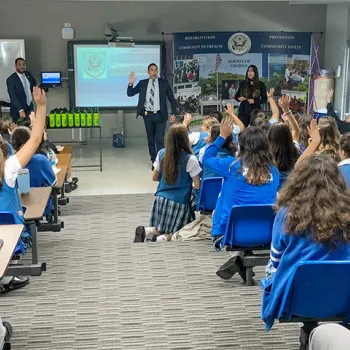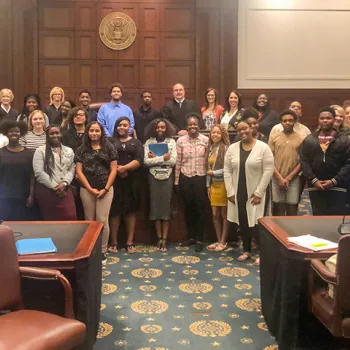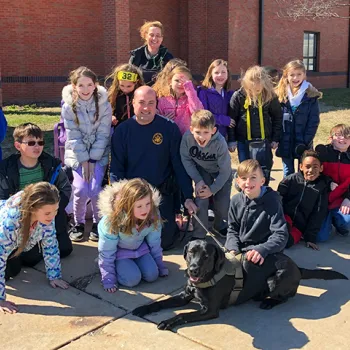When the Eastern District of Missouri’s furry companion, Coal, walks through a classroom door, students suddenly lose interest in their cell phones.
They jostle for the chance to pet the friendly black Labrador retriever. And once they have the students’ attention, officers accompanying the drug detection dog can demonstrate how Coal is able to sniff out traces of illegal substances that may be hidden by former drug offenders on probation.
“Providing for safer communities is a primary part of our mission, and it takes more than just supervising high risk people under supervision,” said Scott Anders, Eastern Missouri’s chief probation officer. “Building a relationship through outreach is vital to instilling a sense of trust and confidence in the communities we serve.”
Several probation offices around the country are similarly doing outreach to local schools in hopes of heightening awareness of their role in communities and encouraging a diverse group of future officers. Raising awareness about the work of pretrial and probation officers is also the key objective of National Pretrial, Probation, and Parole Supervision Week, which is being observed July 21-27 this year.
When Coal isn’t available for school visits, officers get creative by using current events and examples from pop culture to explain their work to students. One officer illuminates the importance of good and timely computer forensics with examples from the popular podcast “Serial.” He explains how officers gain access to information on cellular devices, like the phones of the suspects in Season One of the investigative journalism podcast series.
Morisha Brown, a probation officer for the District of Nebraska, which also has a robust outreach effort to local schools, said, “We run into kids who have interest in the criminal justice field, but aren’t aware of all the options.”
The Nebraska district’s probation office strives to educate and inspire students to consider a career with the courts through its immersion program, a multiday program that places students into roles as a deputy U.S. marshal, an assistant U.S. attorney, an assistant federal public defender, or a probation officer in either the pretrial, presentence, or post-conviction units. The students work through a mock case, covering everything from pretrial proceedings to reentry activities following release from prison.
Colleagues from other court offices, and from the U.S. Attorney’s Office in Omaha, assist in the effort, which is put on in collaboration with Step-Up Omaha, a nonprofit organization that brings together the roughly 20 students selected for the program each year. The district’s probation office also runs shorter reentry simulations at local high schools throughout the year.
“We use a mock-case scenario to give kids a better understanding of how all the various components of the court system come together to deliver justice,” Brown said. “In doing this, we reinforce diversity and inclusion efforts in the courts and allow kids to see a career in the courts as an attainable career aspiration.”
When probation officers in the Southern District of Iowa visit students, some wear tactical gear and others come in business suits – visual cues emphasizing the many facets of their work.
“We try to dispel the misnomer that probation officers are no different than police officers,” said Michael Elbert, the district’s chief probation officer. “Aside from our critical role as federal law enforcement officers, we want to ensure the public understands we also play a significant role in rehabilitation by acting as role models and mentors for persons under supervision.”
Presenters use a specially designed website, thebestservehere.org, to show how an officers’ daily tasks vary based on their areas of focus. When sharing their work with students, officers draw from on-the-job experiences and play videos highlighting work in federal probation.
In San Juan, Puerto Rico, Probation Officer Elisa Abruna and her fellow officers speak to as many as 100 students at a time at local secondary education schools. With a focus on prevention, officers teach good decision-making skills and tie their presentations to issues that resonate with students, such as cyberbullying and drug use. Former offenders often accompany officers to speak with students about how poor decisions can change a life.
“We hope to give youngsters the tools they need to make good life choices and avoid ending up on the wrong side of the court system,” Abruna said. “We want kids to see us as someone they can trust and come to for help, not someone they fear.”
Video
Watch an overview of federal pretrial services and probation functions and the role of probation officers working in the field.
Subscribe to News Updates
Subscribe to be notified when the news section is updated.



